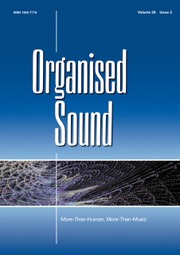No CrossRef data available.
Article contents
Music negotiation: routes in user-based description of music
Published online by Cambridge University Press: 14 February 2002
Abstract
This paper will deal with the changes that have come about in the description of musical knowledge and with the ensuing needs in this field in the era of decentralisation. Throughout almost all the twentieth century, musical practices continued to be expressed by a system of cultural mediations that proved to be a practical impediment to the emergence of non-conventional cultures. Electronic music in particular and its corrosive tendencies, though spread and supported by remarkable composers, has ended up being devoured by academic immune systems. Now that the diffusion of Net computing has induced people to intervene in musical material, a poetics based on interference is spreading. By gaining ground on grammatical and self-referenced poetics, this trend has gradually become a palpable fact and music perceives itself as both individual writing and a production of social meaning. At present, a globe-net-transfer of sound material passes through different contexts and spaces, and seems to be adapting itself to different social speeds. Through the Net we can, on the one hand, replace, manipulate and recontextualise musical parameters until a different significance emerges; at the same time, randomising and hybridising musical objects can partially change our perception of the same musical events. On the other hand, music online databases, audio browsers and musical queries may open the way to overthrowing, reorganising and personalising music description. This could occur at different levels and to different degrees of complexity, both as a social event and as an active, user-based combination of musical structures.
- Type
- Research Article
- Information
- Copyright
- © 2001 Cambridge University Press


